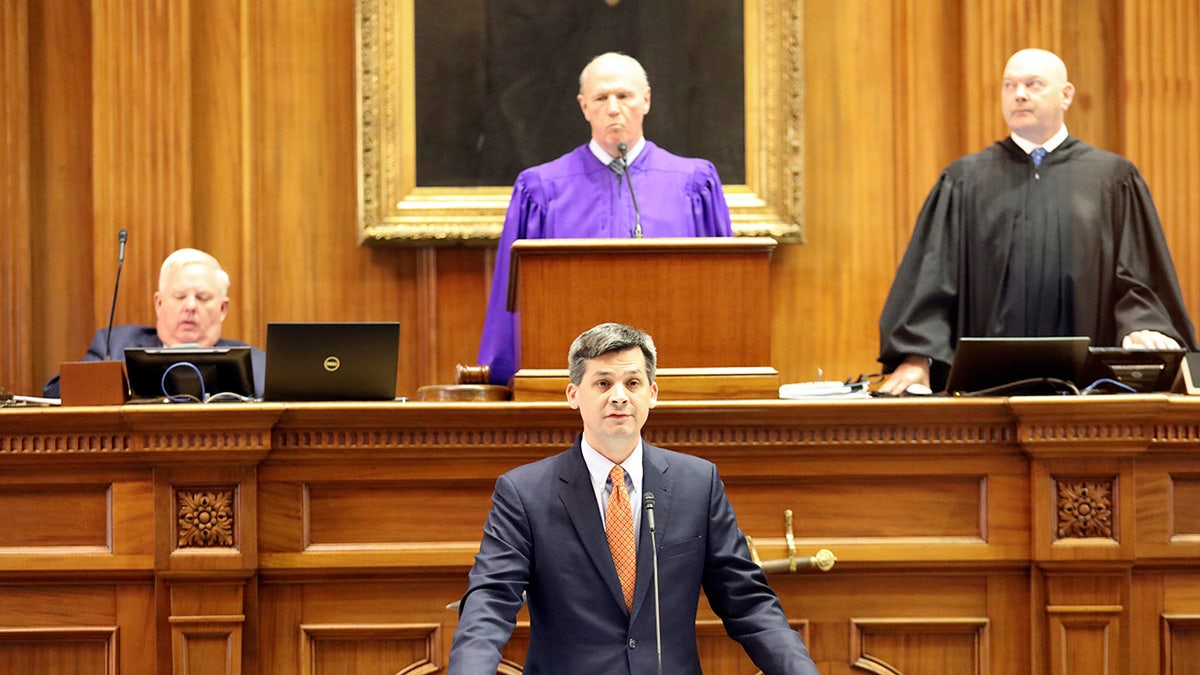Abortion is one area where DeSantis can ‘chip away’ at Trump’s advantage: Susan Ferrechio
Washington Times national correspondent Susan Ferrechio and Fox News contributor Richard Fowler weigh in on issues facing Florida Gov. Ron DeSantis ahead of his anticipated presidential bid.
South Carolina Gov. Henry McMaster, a Republican, signed the bill named the "Fetal Heartbeat and Protection from Abortion Act" into law Thursday.
Joined by members of the General Assembly and pro-life community, McMaster said the legislation "protects life by prohibiting abortions after a fetal heartbeat has been detected, with exceptions for rape or incest during the first 12 weeks of pregnancy, medical emergencies or fatal fetal anomalies."
"With my signature, the Fetal Heartbeat and Protection from Abortion Act is now law and will begin saving the lives of unborn children immediately," McMaster said in a statement. "This is a great day for life in South Carolina, but the fight is not over. We stand ready to defend this legislation against any challenges and are confident we will succeed. The right to life must be preserved, and we will do everything we can to protect it."
The law, which restricts abortion after around six weeks, took effect immediately. South Carolina joined its neighbors in rolling back abortion Thursday. Most abortions after 12 weeks of pregnancy will be banned in North Carolina beginning July 1 and a six-week law in Florida will take effect only if the state’s current 15-week law is upheld by the state Supreme Court.
SOUTH CAROLINA PASSES ‘HEARTBEAT’ ABORTION BILL THAT LIMITS ACCESS TO 6 WEEKS

South Carolina Gov. Henry McMaster signed the Fetal Heartbeat and Protection from Abortion Act on Thursday, restricting abortion after about six weeks. (Joshua Boucher/The State/Tribune News Service via Getty Images)
"There’s really going to be no way for the whole abortion-providing ecosystem to manage it all," Jenny Black, the president of Planned Parenthood South Atlantic, told the Associated Press.
Black, who oversees the organization’s work in North Carolina, South Carolina, West Virginia and parts of Virginia, said providers have had to quickly determine how to comply with the pending laws amid the "decimation of abortion access across the South." She expects new restrictions will compound the stressors on a system that was already seeing lengthy waiting periods in North Carolina driven by an influx of patients from Georgia and Tennessee.

Protesters against a stricter limit on abortion stand in the Statehouse lobby on Tuesday, May, 23, 2023, in Columbia, South Carolina. (AP Photo/Jeffrey Collins)
NORTH CAROLINA GOVERNOR VETOES ABORTION BILL, BUT GOP LEGISLATURE MAY OVERRIDE
Most abortions are banned throughout pregnancy in Alabama, Arkansas, Kentucky, Louisiana, Mississippi, Oklahoma, Tennessee, Texas and West Virginia. In Georgia, it is allowed only in the first six weeks. Therefore, Florida and North Carolina had become destinations for people from other Southern states seeking abortions, and now both face impending restrictions of their own.
The new South Carolina law includes exceptions for the life of the mother and fetal anomalies. In instances of rape and incest, pregnancies can be legally terminated until up to 12 weeks. It also states that biological fathers will be required by law to pay child support at the conception of their child.

Senate Majority Leader Shane Massey speaks in favor of making the state's abortion laws stricter on Tuesday, May, 23, 2023, in Columbia, South Carolina. (AP Photo/Jeffrey Collins)
CLICK HERE TO GET THE FOX NEWS APP
McMaster called for a special legislative session to pass a new abortion framework. This came after Republicans failed to pass a near-complete abortion ban in April, then agreed on a six-week restriction. Democrats in the state last week protested the bill in the House with a 12-hour delay to proceedings.
Fox News' Patrick Hauf and the Associated Press contributed to this report.






